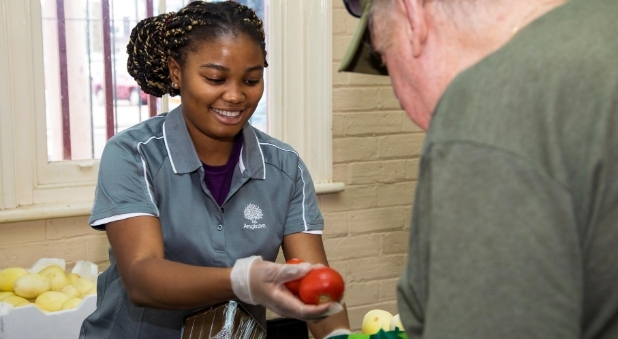As the first reduction in COVID support payments for people on JobSeeker and JobKeeper kicks in this month, it heralds the start of a trickier balancing act for agencies seeking to provide support.
Teresa Clark, the head of food and financial assistance at Anglicare Sydney, says that so far, client numbers have been “pretty much the same”. This is because some below the poverty line have been managing much better while the $550 fortnightly Newstart (JobSeeker) has been almost doubled, while recently unemployed people have struggled to find their way in an upturned economic environment.
“Newly unemployed people are accessing their superannuation, they’re using their savings, they are – I’m assuming – maxing their credit cards and borrowing money from friends and family to stay afloat,” Mrs Clark says. “That doesn’t sound crash-hot for the future.
“Perhaps not in six months but in one year or two years we will see the result of that debt accumulation, especially if those people are not able to get back into work. It’s going to mount debt on top of debt.
“As the supplements are reduced, we also expect to see more of our normal cohort returning... On top of that we expect those newly unemployed people we would not normally have seen to be under more extreme pressure because their incomes will also drop.”
“… if employment hasn’t taken off by the time the supplementary payments wind up in March, “we’re going to see a huge spike in demand”.
She says that if employment hasn’t “taken off” by the time the supplementary payments are due to wind up in March, “we’re going to see a huge spike in demand”.
“If everything opens back up and everyone who was working could get back into work maybe it will be okay, but as less people can get back into work and pay their own way, as the supplements and the benefits drop down, we’re going to see more and more people falling below the poverty line.
“We have done a lot of work to get ready for these spikes… we’re going into this with our eyes wide open… and we always, always encourage people to seek help early. If we can help people to avoid debt traps, if someone can reach out for help rather than going to a lender and getting themselves into long-term debt, that would be a great outcome.”
Meeting need with support
Anglicare’s chief operating officer for Community, Bill Farrand, says a revamp of the food and financial assistance network 18 months ago has made a more tailored response to client needs possible. The network now assists 30,000 people a year – double the number in 2018. Until June next year, the Government has also provided Anglicare with extra funding for emergency relief.
His team has been reviewing COVID’s effects on the different groups they serve, and is therefore preparing for a “significant” increase in demand for financial and emotional support.
“The lower that JobSeeker drops the more likely it’s going to be that people will need to resort to organisations like Anglicare to make ends meet,” he says. “We want to be able to help them in whatever their circumstances require.
“We also think this is a potential moment where churches might really step out towards their communities in need, so we’re keen to respond to this together with the Diocese or the local church in a way that honours Jesus Christ. We’ve started some conversations with diocesan figures but they’re at an early stage.”
Mr Ferrand adds that it’s not clear what extra funds Anglicare might need to support people beyond June 2021.
“... we certainly support JobSeeker being at a higher level than Newstart was.”
“There’s a lot of not knowing here!” he says. “We’ve been funding these services and it would be our intention to continue doing that [but] for the food and financial assistance work we rely very significantly on our supporters. Government puts some money in but a lot of it comes in from our supporters.”
He says that to allow people to “live with dignity… we certainly support JobSeeker being at a higher level than Newstart was. The poverty line is a contested line so it’s not exactly clear what the right level is, but we certainly believe Newstart was too low and just ground people down in poverty.”
Anglicare craves our prayers and involvement as it seeks to help those in need.
For workers:
“They hear some horrific stories and walk a journey with people through some really hard situations,” Mrs Clark says. “Just pray for God’s protection over them, that they’ll be refreshed and renewed and able to continue their work.”
Says Mr Ferrand: “Prayer is critical for us, that we’re on the front foot and ready as things unfold – we need to be agile in our response.”
For people they serve:
Pray for those who have lost their jobs or businesses, and those whose financial or accommodation situation is precarious. “Reaching out to people you know have lost a job and supporting them is really important for people’s mental health – to know that they’re not alone,” Mrs Clark says. [Some families] have dealt with bushfire and now this… They’ve been trying to hold on for so long and they can’t keep their heads above water. You’re just getting hit with wave after wave; it’s a bit relentless.”
For churches and individuals:
“It’d be great for people to talk to their rector about how the local church can engage with Anglicare in caring for their local community through this time,” Mr Ferrand says. “We’re always looking for volunteers for our food and financial assistance work.
“In 2020 I think people have had to look at their own weakness in the face of things, and we really want to make sure we take the opportunity to step towards people in this time… and do that together.”























